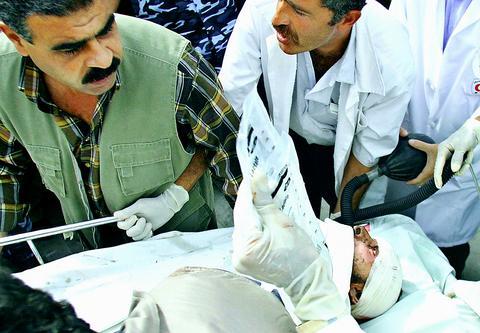Israel's massive military operation into the northern Gaza Strip shows no sign of a let-up after two deadly weeks that have seen 111 Palestinians killed, mainly children, and Qassam rockets still being fired into Israeli territory.
Israeli Prime Minister Ariel Sharon has defied the advice of senior military commanders to withdraw from Gaza, Israeli media reported Monday.

PHOTO: AFP
Senior officers were reported to have told Sharon that Operation Days of Penitence, launched 14 days ago in a bid to halt rocket attacks on southern Israel, had now met its main objective.
But Sharon, keen to deliver a decisive blow to Gaza-based militant factions before next year's planned pullout, told top brass that they must push on with the operation.
Much of the operation has been centered on the Jabaliya refugee camp in the north of the territory. But Haaretz cited senior officers as saying troops were being exposed to an unnecessarily high risk by remaining in the densely populated camp and that rocket launchers had also been moved from Jabaliya.
A total of 111 Palestinians have been killed in Gaza since Days of Penitence, which is the army's deadliest offensive in the territory, began on Sept. 28.
Jabaliya, home to 103,646 ref-ugees, is a squalid network of narrow streets where most people are more concerned about the lack of electricity, running water and food than Qassam rockets.
"It's terrible," said Mohammed. "You go to the hospital and see horrible injuries and children killed by indiscriminate firing directed by Israeli drones. Some people in Jabaliya don't even have water or milk to feed babies."
The UN Relief and Works Agency for Palestine Refugees (UNRWA), which is responsible for the camp, has only been able to deliver three convoys of humanitarian aid, with a fourth due yesterday.
Those convoys will feed around 9,000 people.
"The situation around the camp is extremely bad," said Lionel Brisson, director of UNRWA operations in Gaza. "We're doing less than expected because we cannot bring in supplies."
Brisson questioned the Israeli tactic of collective punishment.
"The regime of closures is one of strangulation," he said. "Israelis are invoking security reasons but it is affecting the whole population, and making people more desperate ... I'm not convinced it'll work.
"There is a general fatigue in the [Gaza] population. They want peace, to live in peace.
"The economic situation in Gaza is very negative. Some 70 percent of the population are living below the poverty line ... and unemployment stands at 44 percent," Brisson said, adding that 120 houses a month are being demolished by Israeli forces.
Israeli Foreign Minister Silvan Shalom indicated Monday that the operation in Jabaliya would soon be over although Defense Minister Shaul Mofaz was more circumspect.
"We are in the last stages of the operation in Jabaliya after the army registered a clear success and hit the terrorist infrastruc-ture," Shalom told reporters.

END OF AN ERA: The vote brings the curtain down on 20 years of socialist rule, which began in 2005 when Evo Morales, an indigenous coca farmer, was elected president A center-right senator and a right-wing former president are to advance to a run-off for Bolivia’s presidency after the first round of elections on Sunday, marking the end of two decades of leftist rule, preliminary official results showed. Bolivian Senator Rodrigo Paz was the surprise front-runner, with 32.15 percent of the vote cast in an election dominated by a deep economic crisis, results published by the electoral commission showed. He was followed by former Bolivian president Jorge “Tuto” Quiroga in second with 26.87 percent, according to results based on 92 percent of votes cast. Millionaire businessman Samuel Doria Medina, who had been tipped

ELECTION DISTRACTION? When attention shifted away from the fight against the militants to politics, losses and setbacks in the battlefield increased, an analyst said Recent clashes in Somalia’s semi-autonomous Jubaland region are alarming experts, exposing cracks in the country’s federal system and creating an opening for militant group al-Shabaab to gain ground. Following years of conflict, Somalia is a loose federation of five semi-autonomous member states — Puntland, Jubaland, Galmudug, Hirshabelle and South West — that maintain often fractious relations with the central government in the capital, Mogadishu. However, ahead of elections next year, Somalia has sought to assert control over its member states, which security analysts said has created gaps for al-Shabaab infiltration. Last week, two Somalian soldiers were killed in clashes between pro-government forces and

Ten cheetah cubs held in captivity since birth and destined for international wildlife trade markets have been rescued in Somaliland, a breakaway region of Somalia. They were all in stable condition despite all of them having been undernourished and limping due to being tied in captivity for months, said Laurie Marker, founder of the Cheetah Conservation Fund, which is caring for the cubs. One eight-month-old cub was unable to walk after been tied up for six months, while a five-month-old was “very malnourished [a bag of bones], with sores all over her body and full of botfly maggots which are under the

BRUSHED OFF: An ambassador to Australia previously said that Beijing does not see a reason to apologize for its naval exercises and military maneuvers in international areas China set off alarm bells in New Zealand when it dispatched powerful warships on unprecedented missions in the South Pacific without explanation, military documents showed. Beijing has spent years expanding its reach in the southern Pacific Ocean, courting island nations with new hospitals, freshly paved roads and generous offers of climate aid. However, these diplomatic efforts have increasingly been accompanied by more overt displays of military power. Three Chinese warships sailed the Tasman Sea between Australia and New Zealand in February, the first time such a task group had been sighted in those waters. “We have never seen vessels with this capability